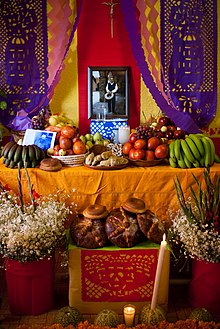The Religion Portal
Religion is a range of social-cultural systems, including designated behaviors and practices, morals, beliefs, worldviews, texts, sanctified places, prophecies, ethics, or organizations, that generally relate humanity to supernatural, transcendental, and spiritual elements—although there is no scholarly consensus over what precisely constitutes a religion. Different religions may or may not contain various elements ranging from the divine, sacredness, faith, and a supernatural being or beings. (Full article...)
 Vital article
Vital article

The afterlife or life after death is a purported existence in which the essential part of an individual's stream of consciousness or identity continues to exist after the death of their physical body. The surviving essential aspect varies between belief systems; it may be some partial element, or the entire soul or spirit, which carries with it one's personal identity. (Full article...)
 Did you know (auto-generated)
Did you know (auto-generated)
- ... that a religious community is a group of people who practice the same religion, but do not have to live together?
- ... that in her 2021 book White Evangelical Racism, professor of religion Anthea Butler called American evangelicalism a pro-Trump, "nationalistic political movement"?
- ... that the nonconformist minister Ichabod Chauncey was banished from England under the Religion Act 1592 and spent two years in exile in Holland where he published a defence of his actions?
- ... that Gamaliel's principle has been used to support religious pluralism and reforms within religious groups?
- ... that Gherardo Gambelli, the incoming archbishop of Florence, served as a prison chaplain in Chad for over a decade?
- ... that religious studies scholar C. Jouco Bleeker believed that religions are like acorns?

Egyptian temples were built for the official worship of the gods and in commemoration of the pharaohs in ancient Egypt and regions under Egyptian control. Temples were seen as houses for the gods or kings to whom they were dedicated. Within them, the Egyptians performed a variety of rituals, the central functions of Egyptian religion: giving offerings to the gods, reenacting their mythological interactions through festivals, and warding off the forces of chaos. These rituals were seen as necessary for the gods to continue to uphold maat, the divine order of the universe. Housing and caring for the gods were the obligations of pharaohs, who therefore dedicated prodigious resources to temple construction and maintenance. Pharaohs delegated most of their ritual duties to a host of priests, but most of the populace was excluded from direct participation in ceremonies and forbidden to enter a temple's most sacred areas. Nevertheless, a temple was an important religious site for all classes of Egyptians, who went there to pray, give offerings, and seek oracular guidance from the god dwelling within. (Full article...)

































































